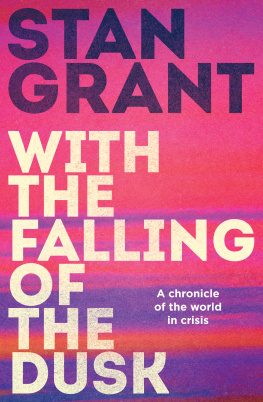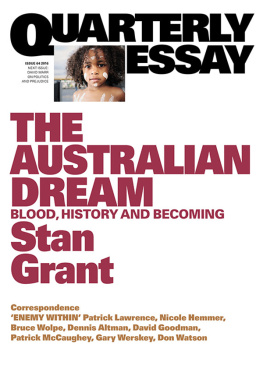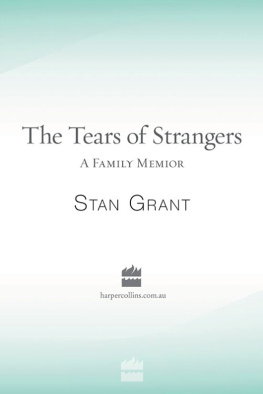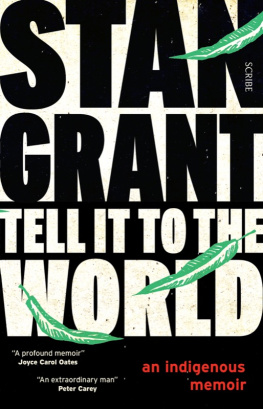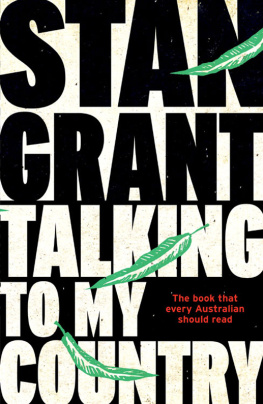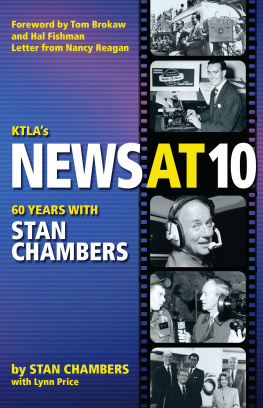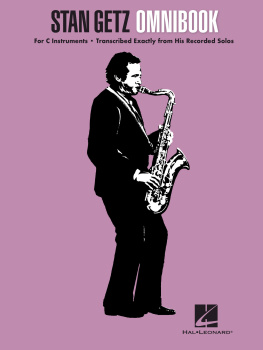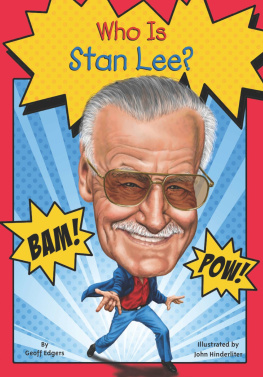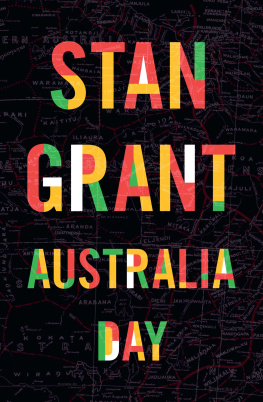Stan Grant - With the Falling of the Dusk: A Chronicle of the World in Crisis
Here you can read online Stan Grant - With the Falling of the Dusk: A Chronicle of the World in Crisis full text of the book (entire story) in english for free. Download pdf and epub, get meaning, cover and reviews about this ebook. year: 2021, publisher: HarperCollins, genre: Politics. Description of the work, (preface) as well as reviews are available. Best literature library LitArk.com created for fans of good reading and offers a wide selection of genres:
Romance novel
Science fiction
Adventure
Detective
Science
History
Home and family
Prose
Art
Politics
Computer
Non-fiction
Religion
Business
Children
Humor
Choose a favorite category and find really read worthwhile books. Enjoy immersion in the world of imagination, feel the emotions of the characters or learn something new for yourself, make an fascinating discovery.
- Book:With the Falling of the Dusk: A Chronicle of the World in Crisis
- Author:
- Publisher:HarperCollins
- Genre:
- Year:2021
- Rating:3 / 5
- Favourites:Add to favourites
- Your mark:
- 60
- 1
- 2
- 3
- 4
- 5
With the Falling of the Dusk: A Chronicle of the World in Crisis: summary, description and annotation
We offer to read an annotation, description, summary or preface (depends on what the author of the book "With the Falling of the Dusk: A Chronicle of the World in Crisis" wrote himself). If you haven't found the necessary information about the book — write in the comments, we will try to find it.
With the Falling of the Dusk: A Chronicle of the World in Crisis — read online for free the complete book (whole text) full work
Below is the text of the book, divided by pages. System saving the place of the last page read, allows you to conveniently read the book "With the Falling of the Dusk: A Chronicle of the World in Crisis" online for free, without having to search again every time where you left off. Put a bookmark, and you can go to the page where you finished reading at any time.
Font size:
Interval:
Bookmark:
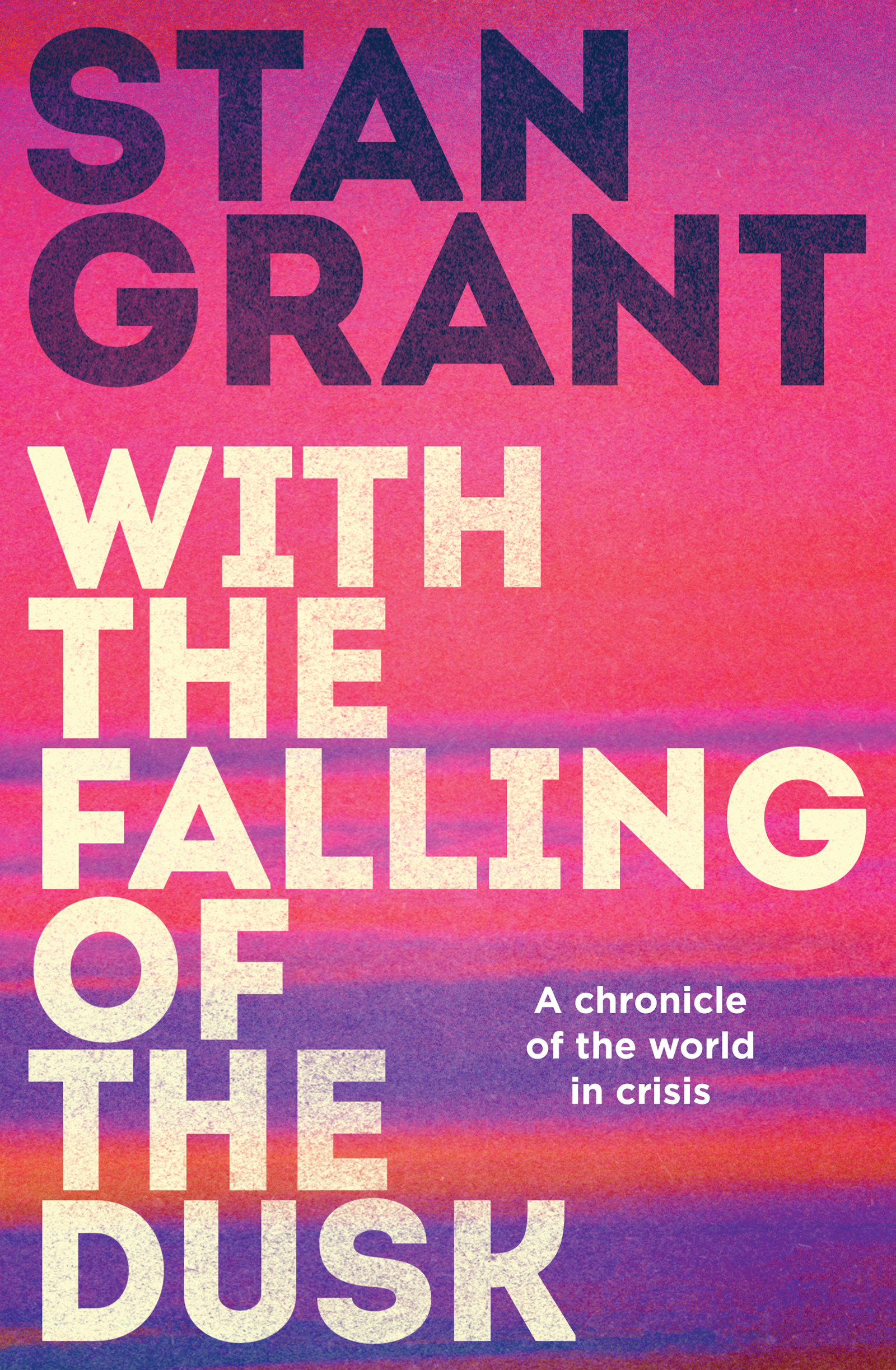

To Brad and Sarmad, my brothers of the road RIP.
Storm and stress today rocks our little boat on the mad waters of the world-sea; there is within and without the sound of conflict, the burning of body and rending of soul; inspiration strives with doubt, and faith with vain questionings.
W.E.B Du Bois
I took my first good look at China from the window of a train on a frozen Christmas morning. I had lived in Hong Kong and made several trips to the China mainland, but this was different: I was here to stay. My first morning in my new home.
I woke early in my sleeper cabin as the sun was rising, and with the smooth of my hand smeared the condensation from the window. Its a curious thing, but my body clock, no matter where I am in the world, no matter what time I have gone to sleep, remains aligned to the sun. As the earth stirs for a new day, so I am gently nudged awake. It is good for a soul such as mine to stir early, to snuggle into silence and allow my mind to follow where my thoughts lead. I had a lot on my mind that day.
My family was still rugged up and asleep. They had, without reservation, excitedly embraced this adventure. So here we all were on a slow train. I wanted my children especially, even if asleep, to feel the movement, the rhythms of the train and the pull of the earth that would work this new place into them. The journey is part of the story that comes from my ancestors, Aboriginal people of Australia whose tracks form a songline across country as vast and foreboding as the one I was now in. It is in the journey that I seek permission, that I ask if this place will let me in.
I have done this everywhere I have been, on long road trips or just walks around unknown streets in new cities. These are my quiet rituals of belonging. I want to allow the place to make space for me; to welcome me; to show me what matters. It may be somewhere to eat, a park bench or a bookstore, but these places invite me in, and in this way I join my stories with all the stories that have come before. What was it the psychologist Carl Jung said? Land assimilates its conqueror. We may think we are masters of all we survey, that we rule the land, that we leave our footprint, yet with every step the land is changing us.
It was cold inside the train, and I shivered a little. Steam rose from my breath, and through the streaky window I looked out on this place. What roads led me here? What twists of fate and providence? I have always lived a restless life, always wandering and wandering is the happiness of the anxious soul. I had forever been moving. My childhood memories are a blur of places and people, dark nights and long roads. I was never more content than when squeezed in with my siblings in the back seat of a car, watching the headlights scatter the darkness. I would count off one by one the white illuminated posts by the side of the road. Sometimes I would catch a glimpse of a kangaroo. I was forever lost in thought, until the movement of the car and the hum of the tyres on the road would lull me to sleep. One small town bled into another, and I grew older, but I never lost the lure of the journey.
Journalism was the perfect calling for someone so anxious and restless. From the moment I walked into a newsroom I felt I belonged. It was freedom. I was in a world of ideas and argument and words. I wanted to chase the story; I wanted to go where the story led. Journalism is not for the timid or those who live by a clock. It is for the reckless and the irascible and the tireless, even the foolish. I can understand the desire for certainty and security, but that wasnt what I wanted. I have never met a good journalist who knows when to switch off. My first instinct was always to say yes to a new story, a new job, a new home, yes, yes, yes. Journalists run into the fire; they run towards the gunshot. Journalists dont like no and they dont say no. My restlessness, my instincts, had taken me around the world, from the islands of the Pacific to Africa, to the great cities of Europe, to the deep history and blood feuds of the Middle East, and now I was on a train to China.
China had always lived in my imagination. That big mysterious place on a map that I recalled from childhood, pinned to the wall of my classroom. I remembered sitting on the floor, hands tucked under my legs, and watching black-and-white film of a land crowded with people, grey suits and bicycles. Everyone appeared to move quickly. I started school at the height of Chinas Cultural Revolution, and I imagine every primary-school-aged child in Australia at the time would have heard the name Mao Zedong, the revolutionary leader of communist China. I recall the time I first saw his image: a portly, serenely smiling figure standing amid a crush of young, feverish faces, all waving Maos Little Red Book, the sayings of this man they called the Great Helmsman.
This was at the height of the Cold War, when the world lived in the shadow of nuclear catastrophe. I can recall watching a film of American kids doing duck and cover drills, sheltering under the desks to avoid radioactive fallout in the event of an attack. The communists were the enemy: the Soviet Union and China. The ABC TV program Behind the News started the year I started school, and this was how I came to know the world, to think of places beyond my own. My class would gather around a television and watch images of the Vietnam War, man on the moon, protest, conflict and chaos everywhere. It left its mark on me, even without me realising it which are the best lessons. It ignited something inside that one day would set me on a journey to tell the stories of foreign places and a world in change.
Back when I was a boy, China was always a hungry land. Who of my age doesnt recall being told to eat all your food because there were children starving in China? This man Mao and his Great Leap Forward had led his country to famine, and tens of millions died. I must have heard somewhere that phrase the sick man of Asia thats what China was called then. It was a big country that could not feed itself.
China was the stand-in for all things foreign or forbidden. There was a schoolyard myth you know the one dig a hole deep enough and it would lead to China. So I did, and it didnt. I learnt about the Chinese in the Australian gold rush of the nineteenth century. I stared at those sepia-toned photos of sinewy, dark-skinned men wearing what looked like a cross between an apron and a dress, with pigtails and usually pushing wheelbarrows. The Chinese were some of the earliest foreigners to come to Australia, yet it says something about how we see our country that they have always been outsiders. Thats because Australia, for all its later embrace of what we like to call multiculturalism, is still, at its core, white. A white person in Australia will never be asked, Where do you really come from? A third- or fourth-generation Chinese Australian will never cease having to explain themselves.
In the days of the White Australia policy, when we wanted to keep the coloured races out, I like all children was raised to fear the yellow peril: those imagined hordes from the north who, we were told, would overrun us. Then in the early 1970s I was swept up in the kung fu craze: I had a poster of the Hong Kong actor Bruce Lee with scars across his ripped abdomen and sang along with Carl Douglass only hit song, Kung Fu Fighting. When the white American actor David Carradine squinted as though staring into a blazing sun and pretended to be a monk from the Shaolin temple, his program,
Font size:
Interval:
Bookmark:
Similar books «With the Falling of the Dusk: A Chronicle of the World in Crisis»
Look at similar books to With the Falling of the Dusk: A Chronicle of the World in Crisis. We have selected literature similar in name and meaning in the hope of providing readers with more options to find new, interesting, not yet read works.
Discussion, reviews of the book With the Falling of the Dusk: A Chronicle of the World in Crisis and just readers' own opinions. Leave your comments, write what you think about the work, its meaning or the main characters. Specify what exactly you liked and what you didn't like, and why you think so.

